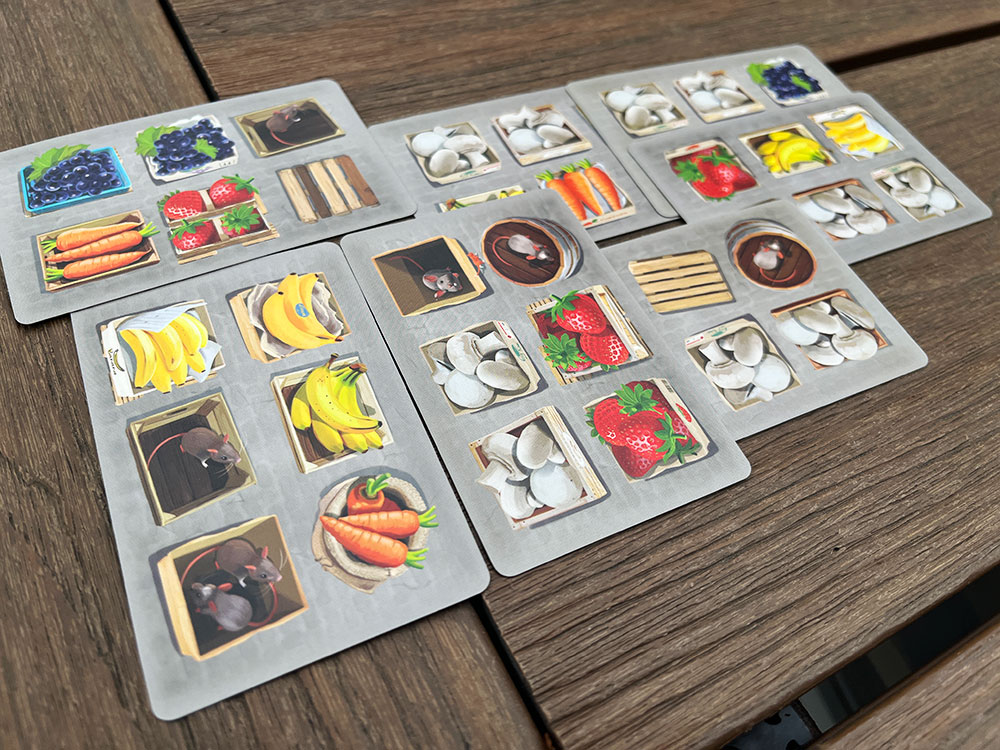 It’s Veggies! A quick-playing card game designed by Jog Kung and published by Devir Games. I’m a little shaky on the history of this game. It appears to have been based on the two-player card game Small Warehouse, but I’m not 100% sure. Anyway, in this card game, you’ll be trying to build out a produce stand with different types of food (and rats apparently). The game promises a short play time with accessible mechanics. Did they succeed? Let’s find out.
It’s Veggies! A quick-playing card game designed by Jog Kung and published by Devir Games. I’m a little shaky on the history of this game. It appears to have been based on the two-player card game Small Warehouse, but I’m not 100% sure. Anyway, in this card game, you’ll be trying to build out a produce stand with different types of food (and rats apparently). The game promises a short play time with accessible mechanics. Did they succeed? Let’s find out.
Veggies is a pattern-building, card-layering game for 2-4 players that takes about 10 minutes to play. Veggies play best with 3-4 players.
Gameplay Overview:
In Veggies, each player starts with a single card in their produce stand. On their turn, they must play a new card, either the card from their hand or one of the 3 face-up cards in the market. New cards must either be placed orthogonally adjacent to an existing card or layered on top of a card.
The goal is to create areas of similar types of produce. Cards may also contain empty pallets (which score no points) or rats, which lose you 2 points per rat. Turns go by in this manner until each player has played their 8th card.
For scoring, each player figures out which type of produce they have the largest area of. Then EVERY player scores that produce type by multiplying their largest area times the total number of areas of that type. Most points wins.

Game Experience:
My first thought while playing Veggies was why the heck is this game called Veggies. There are 5 types of produce in this game and only two of them are vegetables (strawberries, bananas, grapes, carrots, mushrooms). And this isn’t like the “is a tomato a fruit or a vegetable” debate. (Totally a veggie.) I mean, a carrot is clearly a vegetable and a banana is a fruit by any metric. So, whoever picked this title clearly needs to go back to Botany 101.

But anyway, the gameplay in Veggies is definitely easy to learn and it works well as a filler game. Our plays never even got near the 20-minute mark. Turns go by quickly with the play a card, draw a card mechanic. However, I did find the 1 card hand pretty limiting as we ended up spending most of our time looking to the market for a card to play.
The most interesting part of Veggies is its scoring mechanic. While the natural inclination might be to have the largest area possible of one veggie, at some point you need to branch off with more areas. Because, you know, math. One patch of carrots with 7 slots is only going to score you 7 points, while a patch with 5 slots, 1 slot, and 1 slot will score you 15 points.
You also need to be aware of what your opponents are doing during the game, since you’ll be scoring their largest type as well. It’s pretty easy to glance across the table and see that player A is going for mushrooms and realize that you need to get some of those as well.

However, that’s where the biggest issue with the game comes in. There are three cards in the market and one in your hand. This means you’ll need some luck to get the cards you want. In one game, it was clear one player was going for strawberries and I was only ever able to get 1 card with a strawberry. They were all scooped up out of the market by the time my turn rolled around and I was never really able to draw one into my hand. So luck of the draw can definitely have an impact on your score.
I also noticed that as the game progresses, each player will kind of settle in on what produce they are shooting for. With less players, this makes things a bit less interesting. In a two-player game, if one player is going for bananas and the other carrots, the other three fruits and veggies are pointless (literally and figuratively). This is less of an issue at the higher player counts though.
Final Thoughts:
Overall, Veggies is a fine game. It’s the type of game you’ll play and then when it’s done say, “that was cute” before moving on to something else. It’s not bad by any stretch, but also isn’t one that will probably have you yearning to play very often. It’s a filler game, and a quick-playing one at that, and it fills that role admirably. It’s also pretty portable, constituting only of a handful of cards. However, considering it costs less than $10, it’s still worth grabbing as an impulse buy or if you need a game to get that online cart over $100.
Final Score: 3 Stars – A decent filler game that plays quickly and is quite affordable.
 Hits:
Hits:
• Interesting scoring mechanic
• Quick to play
• Easy to learn
Misses:
• Luck of the draw can set you back
• Why is it called “Veggies”?!?
Source: Board Game Quest





